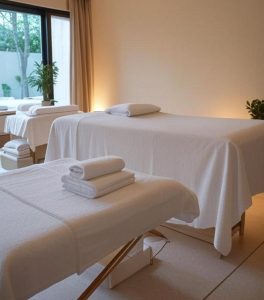 South Korea’s wellness landscape presents a fascinating paradox. On one hand, the nation celebrates the communal and therapeutic culture of the jjimjilbang (public bathhouse), a beloved institution for families and friends. On the other hand, the private massage and spa industry operates within a complex web of legal ambiguity, social stigma, and intense debate. This creates a challenging environment for both consumers and legitimate business owners, where outdated laws and public perception often blur the line between therapeutic care and illicit activity.
South Korea’s wellness landscape presents a fascinating paradox. On one hand, the nation celebrates the communal and therapeutic culture of the jjimjilbang (public bathhouse), a beloved institution for families and friends. On the other hand, the private massage and spa industry operates within a complex web of legal ambiguity, social stigma, and intense debate. This creates a challenging environment for both consumers and legitimate business owners, where outdated laws and public perception often blur the line between therapeutic care and illicit activity.
The core of the legal controversy stems from the Medical Service Act. This law stipulates that only visually impaired individuals who have completed a rigorous, state-sanctioned training program are legally permitted to work as massage therapists. Originally enacted to provide stable employment for the blind, this regulation has inadvertently pushed a massive, high-demand industry into a gray market. Consequently, thousands of sighted therapists and spas operate without official sanction, creating uncertainty for customers seeking reliable services. This is where consumers often turn to online platforms to find information on verified establishments to navigate an otherwise opaque market. Online directories like OPCMD feature verified establishments like the Bucheon officetel spa. These platforms attempt to provide a layer of trust where official regulation is lacking.
The Weight of Social Stigma and Moral Opposition
Beyond the legal hurdles, the spa industry battles a powerful social stigma. For decades, some massage parlors have been fronts for illegal activities, cementing a negative association in the public consciousness. This perception is strongly amplified by conservative social groups and religious organizations, which frequently protest the industry on moral grounds. They argue that deregulating massage services would only encourage vice and exploitation, further degrading the social fabric.
This widespread condemnation casts a long shadow over the entire sector. Legitimate entrepreneurs who invest in high-end equipment and professional training to offer genuine therapeutic services find themselves unfairly lumped in with illicit operators. Therapists who are passionate about wellness and healing are often forced to work discreetly, facing judgment from their communities and even their own families. The stigma makes it difficult for the industry to mature and for professional standards to be openly discussed and implemented.
Evolving Attitudes and the Modern Wellness Movement
Despite the legal and social challenges, public attitudes are slowly beginning to shift. South Korea is a high-stress, fast-paced society, and the demand for mental and physical wellness services has never been greater. A new generation of consumers increasingly views massage not as a luxury or a vice, but as an essential component of self-care. They seek relief from chronic pain, work-related stress, and the pressures of modern life.
This growing demand is fueling a push for legitimacy from within the industry. Modern, sophisticated spas are emerging, focused on creating a clean, safe, and professional environment. These businesses are actively trying to rebrand the image of massage therapy, emphasizing its health benefits and aligning it with the global wellness movement. Proponents of reform argue that amending the Medical Service Act is long overdue. They believe that regulation would not only legitimize the profession for thousands of sighted therapists but also generate significant tax revenue, improve safety standards, and allow for better oversight to root out illegal activities.
The Role of Verification in a Contested Space
In the current landscape, with the government and the industry at a standstill, third-party verification systems have stepped in to fill the void. In the absence of a formal licensing system for most spas, these online communities provide a crucial service. They offer reviews, share experiences, and create a system of accountability that helps consumers make more informed decisions. By curating lists of establishments that are vetted for cleanliness, professionalism, and legitimacy, they empower users to find trustworthy providers.
This market-driven solution highlights the public’s desire for safe and reliable spa services. It demonstrates that when official channels fail to adapt to market realities, consumers and businesses will find alternative ways to establish trust. While not a substitute for comprehensive legal reform, these platforms serve as a temporary bridge, helping to protect consumers and reward legitimate businesses in a complicated industry.
READ ALSO: How to Effectively Market your Medical Spa Business
A Path Forward Remains Unclear
The future of South Korea’s spa industry hangs in the balance, caught between a protective law for the visually impaired, strong moral opposition, and immense consumer demand for wellness. The debate touches on sensitive issues of workers’ rights, public health, and social morality. Finding a resolution will require a nuanced conversation and a willingness to compromise from all sides. The ultimate challenge is to create a system that protects vulnerable workers, ensures consumer safety, and allows a legitimate industry to thrive, finally separating the art of healing from the shadows of stigma.


